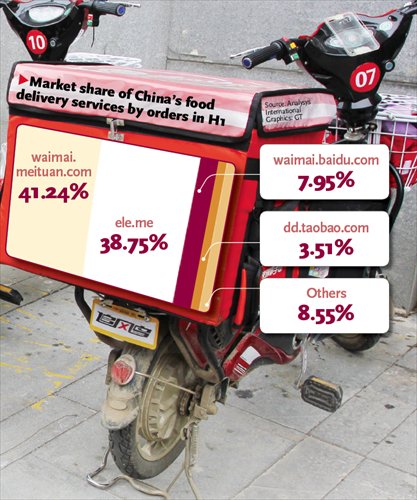
Hotly competitive food delivery business leads to rethink – and friction – among Internet giants
A street brawl between employees of group-buying site meituan.com and those of Koubei, a relatively new life service online-to-offline (O2O) business of e-commerce giant Alibaba Group Holding, may be a sign of the tensions being created by Alibaba's evolving strategy to capture the Internet food delivery business, experts said.
That business was worth 15 billion yuan ($2.35 billion) in 2014, according to the 21st Century Business Herald newspaper, which is based in Guangzhou, South China's Guangdong Province.
Meituan is pressuring vendors who use the payment tools of Alipay, a unit of Alibaba, to take down their Alipay ad posters and close their online shops on Alipay, the 21st Century Business Herald reported on Monday, citing unidentified sources.
On October 8, Meituan (which has received minority investment from Alibaba) and Dianping, an online review site, merged. The companies have retained some of their original managements and functions.
However, Alibaba is considering pulling out of the merged company, known as Xinmeida, to focus on its new venture Koubei, which is currently focused on food delivery, the newspaper report said.
Meituan's management might be upset with that idea, media reports said, since its business overlaps with Koubei's.
Dianping previously received investment from Alibaba's rival, Tencent Holdings.
An employee in the PR department of Koubei has confirmed to the Global Times that some of its vendors were harassed by "operatives" from an industry player, which the person did not identify.
In June, Alibaba and its financial arm Ant Financial Services Group each invested 3 billion yuan to set up Koubei, whose services can be accessed via the interface of the Alipay app, an established online payment channel in China, with a user base of 400 million.
So far, Koubei has some 400,000 restaurants or caterers registered on its platform, according to the PR employee at Koubei.
Experts said the vendors' conflict might be a sign of the escalation of competition over the emerging food delivery market.
Alibaba might want to be the controlling holder of its life service O2O vehicle, which may be leading to its shift toward Koubei and away from the merged company, Liu Xuwei, an analyst with market research firm Analysys International, told the Global Times Monday.
"The life service O2O market is too big to be overlooked, and every giant is working on it," Liu said. "Alibaba is a latecomer but its online payment channel [Alipay] is a powerful tool for it to gain market share."
In terms of food delivery services, Meituan held a dominant 41.24 percent market share in the first half of this year, according to a report by Analysys International in July.
Ele.me had a 38.75 percent share and waimai.baidu.com, the food delivery service of Baidu Inc - another Internet giant - had a 7.95 share.
At that point, Alibaba had a service called dd.taobao.com, which held a 3.51 percent market share. The service was absorbed into Koubei in July, a month after the new company was founded.
A PR representative of meituan.com, who asked not to be identified, told the Global Times Monday that the reported incident was the act of individual employees and that Meituan had "no issue" with Alipay.
The person said they had not heard of any move by Alibaba to stop investing in Meituan.
Zhao Yang, an analyst with Beijing-based CCID Consulting, said if Alibaba did give up its stake in Meituan, this could be read as a shift in its investment strategy, which would be to avoid the "complicated investor relationship" that followed the merger.
There are plans for Xinmeida to seek new financing, with few details known.
This "could be an opportunity for Alibaba to exit and stop being a stakeholder of a company also invested in by its competitor Tencent," Zhao said.
Both Alibaba and Tencent declined to comment on these developments.


















































